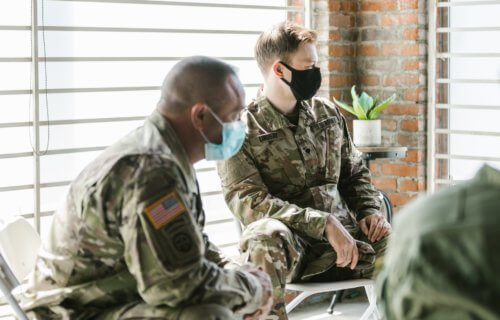NEW HAVEN, Conn. — Since the military veterans community in the United States has an unusually high suicide rate, health experts were afraid that the COVID-19 pandemic may increase their risk of mental illness — specifically among individuals who suffer from post-traumatic stress disorder (PTSD). However, a recent study finds nearly half of U.S. veterans report experiencing a boost in their mental health during the health crisis.
According to a recent nationwide survey of over 3,000 veterans, taking part in the National Health and Resilience in Veterans Study, 12.8 percent experienced PTSD symptoms associated with COVID-19. Another eight percent stated they considered suicide during the pandemic.
However, a remarkable 43.3 percent of participants reported positive psychological effects during the pandemic. That’s over five times the proportion of those contemplating suicide and more than three times the number experiencing PTSD symptoms due to COVID. These veterans experienced a better sense of appreciation, deeper social ties, and a stronger feeling of self-worth.
“Yes, there have certainly been many negative mental health consequences of the pandemic, but we are also seeing that a considerable proportion of people may experience positive psychological changes,” says lead author Robert Pietrzak, director of the Translational Psychiatric Epidemiology Laboratory of the U.S. Department of Veterans Affairs’ National Center for PTSD and an associate professor of psychiatry and public health at Yale, in a university release. “This suggests that the experience of stress and trauma related to the pandemic can lead to positive personal growth.”
Veterans building up a resilience to the pandemic
For the last 10 years, Pietrzak and study senior author Steven Southwick have been investigating veterans who undergo “post-traumatic growth” after a terrible event. Specifically, scientists have been studying the idea of resilience, or how individuals experiencing trauma find a way to recover. According to the notion of post-traumatic growth, while trauma may increase the likelihood of developing mental illnesses such as PTSD, trauma may also stimulate good emotional development.
Pietrzak and Southwick first surveyed veterans regarding their psychological health from November of 2019 to March of 2020 for the current findings. The onset of the pandemic prompted researchers to conduct another study of the same group the following year. They looked at the veterans’ PTSD symptoms and the possible “hidden side-effect” associated with COVID for this second survey.
According to the 43.3 percent of the 3,078 veterans participating in both questionnaires, the pandemic caused beneficial psychological effects in their lives. More than 70 percent of the soldiers displaying PTSD symptoms related to COVID experienced these changes.
“Post-traumatic growth is a process that often happens naturally and is stimulated by reflective processing about a traumatic event,” Pietrzak explains. “Sometimes you need to be sufficiently shaken by an experience and even experience symptoms of PTSD to begin to process it at a deeper level and ultimately be able to grow from it.”
Increased post-traumatic development, namely an enhanced appreciation of life and stronger interpersonal connections, also had a connection to a 40-percent reduced risk of considering suicide during the pandemic. This study implies that psychological therapies to encourage post-traumatic development may be an effective way to avoid veteran suicide.
‘Grow through what you go through’
The notion of post-traumatic development is not new, but the scientific study of the condition is. Philosophers, intellectuals, and even religious and spiritual communities have all acknowledged the possibility that traumatic crisis can be transformative force for good.
“The saying ‘Grow through what you go through’ captures the essence of post-traumatic growth,” Pietrzak concludes.
The researchers intend to continue following this same group of veterans over time to assess the extended course of post-traumatic development and if it may aid in the promotion of resilience to other painful experiences.
This findings appear in the journal JAMA Network Open.
